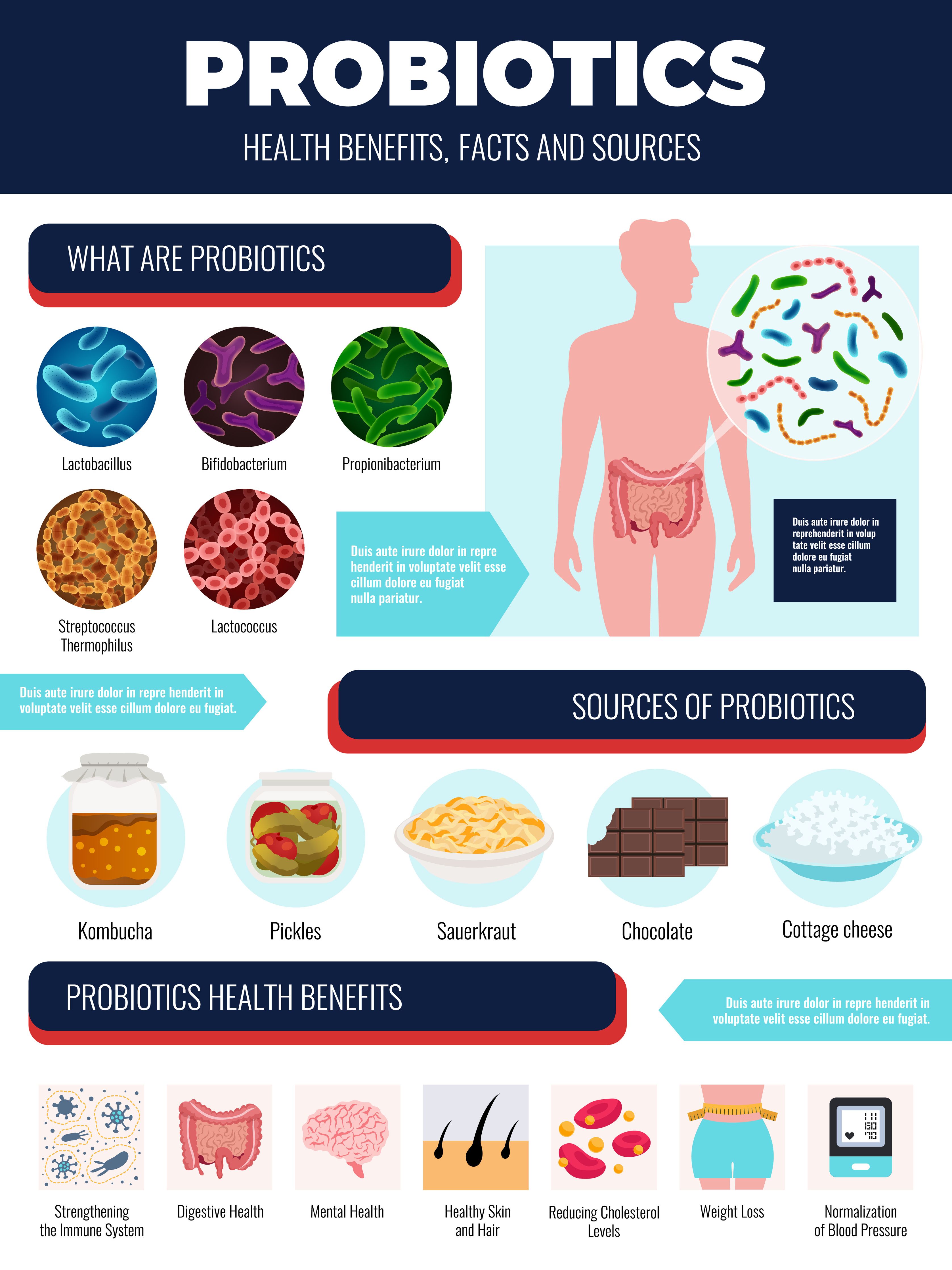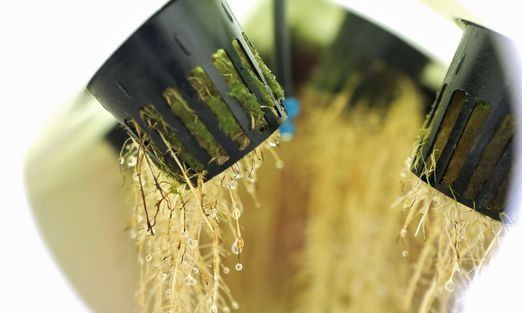You probably have heard that probiotics can have amazing health benefits for us humans, but did you know that probiotics are hugely beneficial for plants and their health as well? Which in turn means healthier plants (less stress on the plants and grower) and maximizing nutrients to turn the fruits and vegetables we know and love into true SUPER FOODS!
What are probiotics, exactly?
Probiotics are beneficial live microorganisms, bacteria and/or yeasts (2), that are naturally occurring within us and nature. When we hear the word bacteria, we often think of it as a bad thing; however, there are trillions (3) of strains of bacteria that naturally live within us. These bacteria consist of harmless, good, and bad strains. The remarkable thing is that the good bacteria (probiotics) help to keep the bad bacteria from invading (4) and can have huge impacts to our physical, mental, and even emotional wellbeing…we’ll get into those later. They are SO vital to our planet and human ecosystems that we could not survive without them (5). A study in 1977 stated that bacteria outnumber our cells by 10:1 (6)! A more recent study showed we have just as many human cells as bacteria, 1:1 (7). There could be some discrepancies with these studies, including the amount of time that has passed in relation to a decrease in our microbiome (see reasons below). Regardless, there’s a lot!!
How does this relate to plants?
Bacteria are the life of the soil. They are what keep the soil healthy and thriving by improving soil structure, recycle nutrients (particularly carbon, nitrogen, phosphorus, and sulfur) and water, improve nutrient storage, provide large quantities of nitrogen for plant growth, and even produce antibiotics that protect the plants from disease-causing organisms and plant pathogens.
“As the soil is disturbed less and plant diversity increases, the soil food web becomes more balanced and diverse, making soil nutrients more available in an environment better suited to higher plants. Diverse microbial populations with fungus, protozoa and nematodes keep nutrients recycling and keep disease-causing organisms in check” (8).
Bacteria are proving to not only be beneficial for soil-based agriculture, but hydroponics as well. These bacteria can correct atmospheric nitrogen-excess nitrogen that can cause several adverse health and ecological effects (9), increasing nutrient uptake to plants and decreasing the instances of disease (10). This means more nutrients for you and the plants, and even less of a need for biological pest and disease controls (even if they are organic), letting nature do what it does best!
With Big Ag depleting the soil of these essential microorganisms by spraying chemicals like glyphosate, among other practices, the ecosystem is no longer thriving and requires the use of more chemicals to ward off pests and disease. We are not talking just soil here. This means our food is sterile and full of toxic chemicals.
“Chemicals used for agricultural purposes not only disrupt soil microbial life, but also directly contaminate the food we eat, the air we breathe, and the water we drink. In fact, herbicides like glyphosate are now showing up in everything from our drinking water to our cereal bowls” (Kiss the Ground).
There’s a better way!
Going back to the way God intended it to be. Organic is a term that has been hugely over-popularized. However, organic is the way things used to be before “organic” was even a term, it just was. It is so much more than organic; it’s about adding life back into the soil and letting the bacteria do their amazing work - we get to reap the benefits! This means that the fruits and vegetables we consume are not only healthier and are higher in nutrients (11), but we are also getting those “probiotic” microorganisms with astounding health benefits!
Benefits of Probiotics in your diet
The majority of those trillions of microorganisms we talked about earlier reside in our colon (12). These microorganisms are called our “microbiome” and they play important roles in breaking down food, synthesizing vitamins and defending against pathogens, and more. There are many factors that determine how healthy our gut microbiome is, such as - whether a child was breastfed (13), being born by C-section and not being exposed to microorganisms like Lactobacilli, lack of early childhood exposure to microbes, antibiotic use, chemical exposure, the Standard American Diet (SAD) consisting of highly refined carbs, processed foods and minimal nutrients, and time spent indoors vs outside (14).
We are hearing more and more about people having an increase in food allergies and intolerances. “Between 1997 and 2011, IgE-mediated food allergies increased by 50 percent in American children... An emerging body of research indicates that alterations in the normal human gut flora play a role in the development of food allergies and intolerances. Modulation of the gut microbiota may alleviate food allergies and intolerances and potentially restore tolerance to triggering foods” (14).
This is astounding! What’s even more astounding is that research is also coming out about the brain-gut connection (15) and how the human gut microbiome impacts brain health in numerous ways (16). It influences memory, mood, and cognition. It can play are a role in alcoholism, chronic fatigue syndrome, fibromyalgia, restless leg syndrome, multiple sclerosis, schizophrenia, mood disorders, SIBO, and degenerative or autoimmune neurologic disease. This information is from just one journal article (17) and is probably just scratching the surface! Not to mention the other benefits of probiotics including weight loss (18), improved digestion (19), healthier skin, including acne relief (20), reduced risk of disease (21) and a healthier immune system (22).

Now let’s talk about how to reap all the benefits of these awesome microbes…
Eat fresh, organic fruits and vegetables daily. Did you know that 90% of the microbes of an apple are found in its core (23)?
Add in prebiotics that help feed the probiotics…these include bananas, apples, berries, legumes, garlic, onions, Jerusalem Artichoke, leeks, nuts, and seeds (24,25).
Spend time outdoors as much as possible! Growing a garden and interacting with the soil is the perfect way to help increase your microbiome!
Only take antibiotics when absolutely necessary.
Eat all those awesome Lacto-Fermented foods. These include Sauerkraut, fermented sourdough bread, kimchi, yogurt, raw cheese, raw milk, naturally fermented vegetables, including pickles (without vinegar), kefir, kombucha, and more. Or better yet, make your own! Here’s an awesome video (HOW TO FERMENT any VEGETABLE! get more NUTRITION - YouTube) on how to make your own fermented veggies…it’s super easy!
The lost art of growing food organically in live nutrient and microbe-rich soil, and fermented foods like making traditional sourdough bread, as our great-grandmothers and grandmothers did, is making a comeback, and for a good reason! These benefits are too amazing to ignore. It’s a fairly simple change to your everyday diet that can have huge beneficial impacts to your health and the health of your children. If you are a parent, it is crucial to help build your children’s microbiome now to help them thrive in the future!
Winter is coming upon us, and our fresh fruit and vegetable consumption may not be as prolific, unless you have an Eden Grow Tower of course😉. This is a great time to add in those fermented veggies to help us digest those heavy winter stews!
We are currently looking into more ways to add microbes into our Grow Tower operation, including testing an organic nutrient solution containing compost. We are always striving at Eden to bring you the freshest and healthiest produce possible for you and your family to enjoy all year long!
For more information on The Eden Grow Tower, head over to our Learn More page.
References:
1. Probiotics: What You Need To Know | NCCIH (nih.gov)
2. Yeasts as probiotics: Mechanisms, outcomes, and future potential - ScienceDirect
3. Probiotics 101: A Simple Beginner's Guide (healthline.com)
4. 'Good' bacteria keep immune system primed to fight future infections -- ScienceDaily
5. Could Humans Live Without Bacteria? | Live Science
6. MICROBIAL ECOLOGY OF THE GASTROINTESTINAL TRACT | Annual Review of Microbiology (annualreviews.org)
7. Revised estimates for the number of human and bacteria cells in the body | bioRxiv
8. Role of Soil Bacteria | Ohioline (osu.edu)
9. Nitrogen and Water (usgs.gov)
11. (PDF) Increased nutritional value in food crops (researchgate.net)
12. Revised Estimates for the Number of Human and Bacteria Cells in the Body (nih.gov)
13. Breastfeeding and the Microbiome | OHSU
14. The Gut Flora and Food Allergies Connection (kresserinstitute.com)
15. The gut-brain connection - Harvard Health
16. The Gut Microbiome and the Brain (nih.gov)
17. The Gut Microbiome and the Brain (nih.gov)
18. Probiotics for weight loss: a systematic review and meta-analysis - PubMed (nih.gov)
19. Probiotics and Digestive Health: Benefits, Risks, and More (healthline.com)
20. Potential Role of the Microbiome in Acne: A Comprehensive Review (nih.gov)
21. Impacts of Gut Bacteria on Human Health and Diseases (nih.gov)
22. Probiotics and immune health (nih.gov)
23. The Best Probiotic? Fruits and Vegetables. - The Atlantic
25. Prebiotics: How to Feed Your Good Bacteria (psu.edu)
